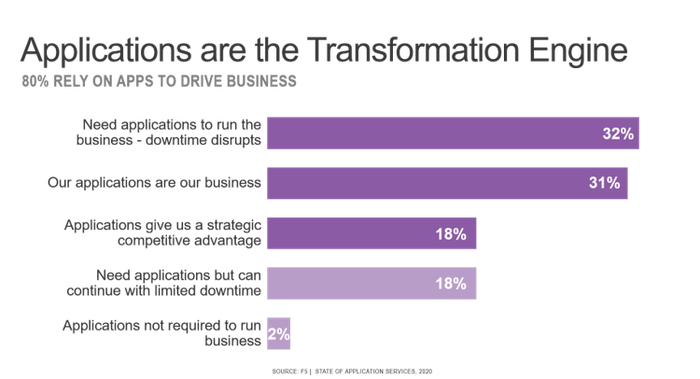Successful Digital Transformation Means Apps and App Services
As organizations progress through the phases of digital transformation, a resilient foundation is critical to the long-term success of any initiative. When business is based on apps, that foundation is application services.
February 24, 2020

Digital Transformation is, for many organizations, just another buzzword. But for the majority, it's a journey on which they have embarked with the goal of advanced toward a more data-driven, digital-based business.
That journey loosely comprises three distinct phases:
Task Automation. Organizations embrace automation to improve efficiency across business and operational processes. New applications and integrations are born out of a need to digitize tasks that focus on enhanced productivity and greater engagement with customers. Application services provide speed, scale, and security of these new digital capabilities expressed as applications and services.
Digital Expansion. Based on lessons learned in the first phase, organizations enter a period of accelerating transformation. The focus moves up the stack from tasks to processes, resulting in an expanding app portfolio and an explosion of telemetry and business data. Organizations in this phase begin putting in place the foundations required to take strategic advantage of advanced analytics fueled by extensive data sets. Distributed application services play a significant role as they are instrumented to emit the telemetry about digital capabilities needed to extract business value.
AI-Assisted Business, Operations, and Security. Advanced analytics, supported and delivered via the cloud, deliver business value to organizations through discovery of patterns and relationships and the detection of anomalies in a now steady stream of data. Organizations will derive value from actionable insights produced by AI-backed analysis that enables new operational and business models. Application services continue to fuel the data pipeline necessary to support these models.
Our research shows that most (80 percent) of organizations are executing on digital transformation initiatives. Their goals are largely the same, with a focus on increasing the velocity with which new services and/or products can be introduced to the market. To achieve that goal, we see organizations advancing through these phases at varying rates. Most are currently operating in the first phase, with a significant percentage moving through the second. Less than one in five are executing in phase three.
All rely on applications. We found this to be true across every geography, industry, and role. For nearly a third of organizations (31 percent), applications are the business. Perhaps surprisingly, the industry most reliant on applications as their business is not technology or telecommunications, but financial services. Anecdotally, that rings true as we see an indivisible integration between the business (banks, insurance, investment firms) and technology (apps).

20200221 LoriMacV.png
Irrespective of industry, however, there is a deep and growing reliance on applications - and thus the application services that deliver and secure them - that cannot be ignored because of the inexorable expression of business functions as digital capabilities thanks to digital transformation.
What this means in practical terms is that organizations need to pay as much attention to security, speed, and scale of their operation of applications as it does the applications themselves. The reliability of the processes that build, deliver, and deploy digital capabilities will be as important as the capabilities themselves. Operational failure will be virtually indistinguishable from business failure.
As organizations progress through the three phases of digital transformation, it's important for them to remember that a resilient foundation is critical to the long-term success of any initiative. When business is based on apps, that foundation is application services.
About the Author
You May Also Like




